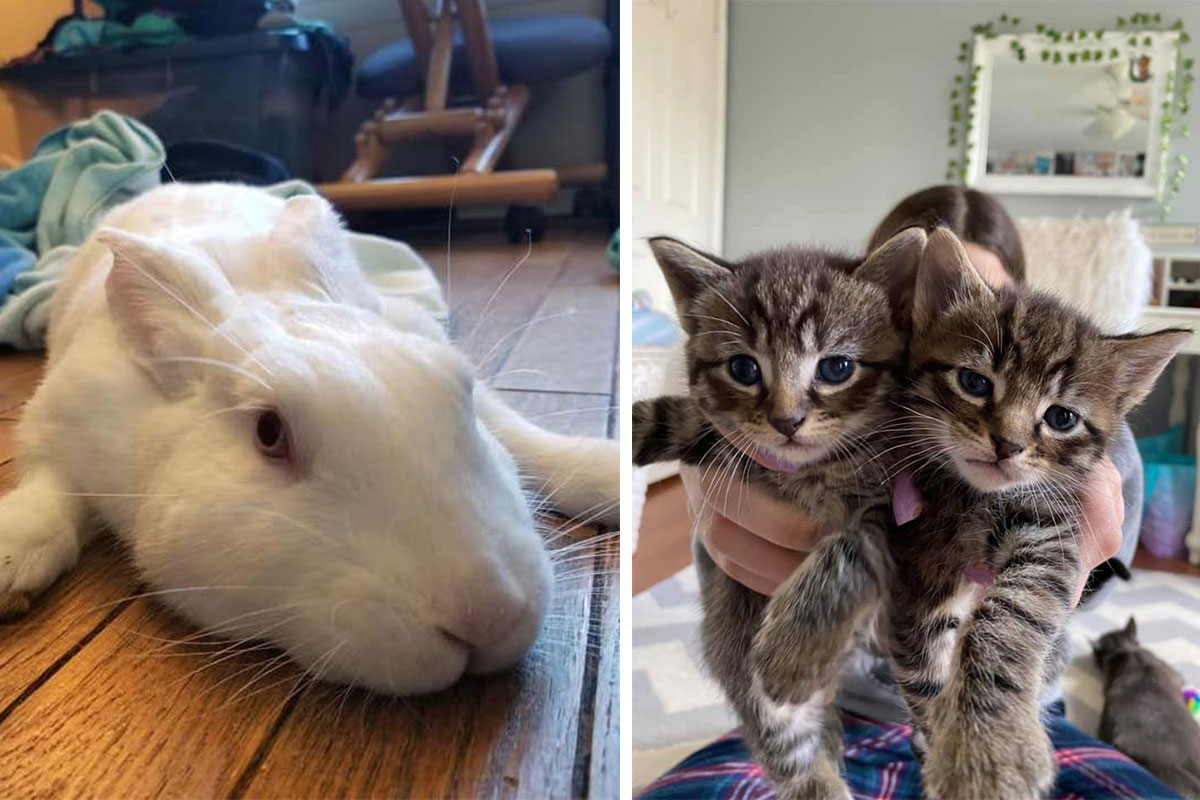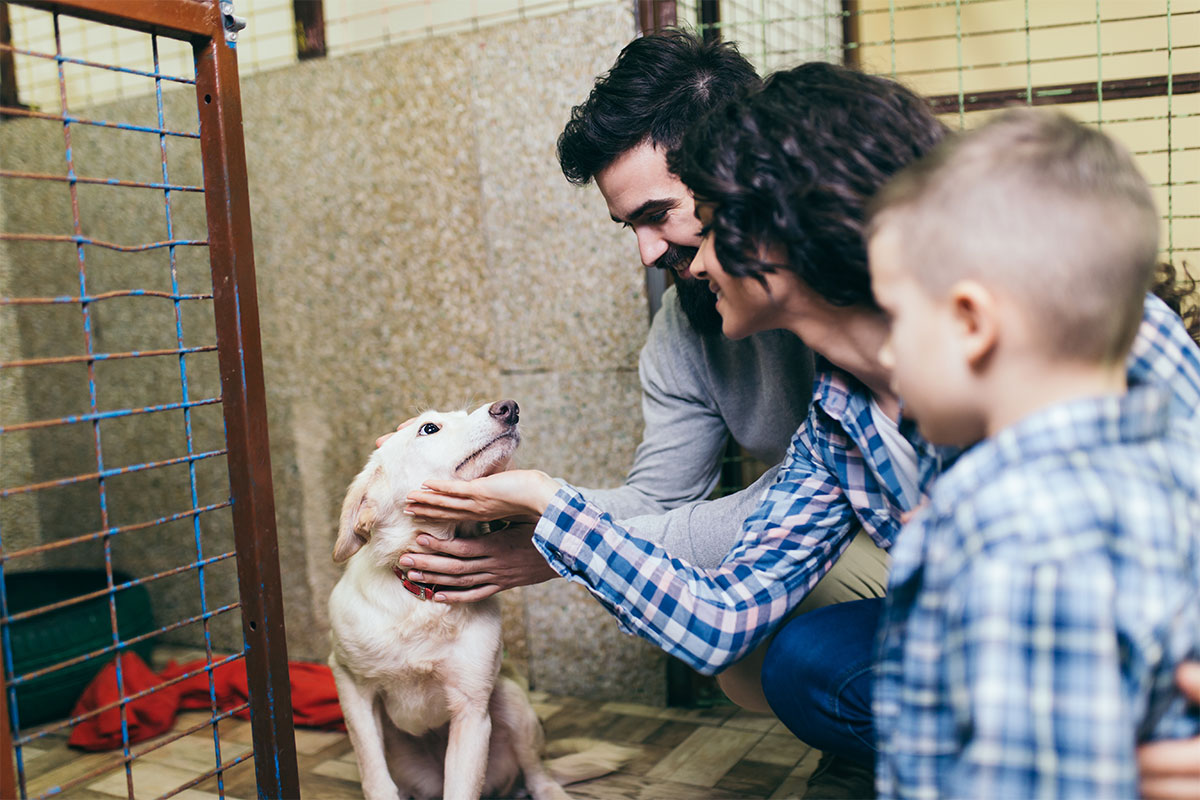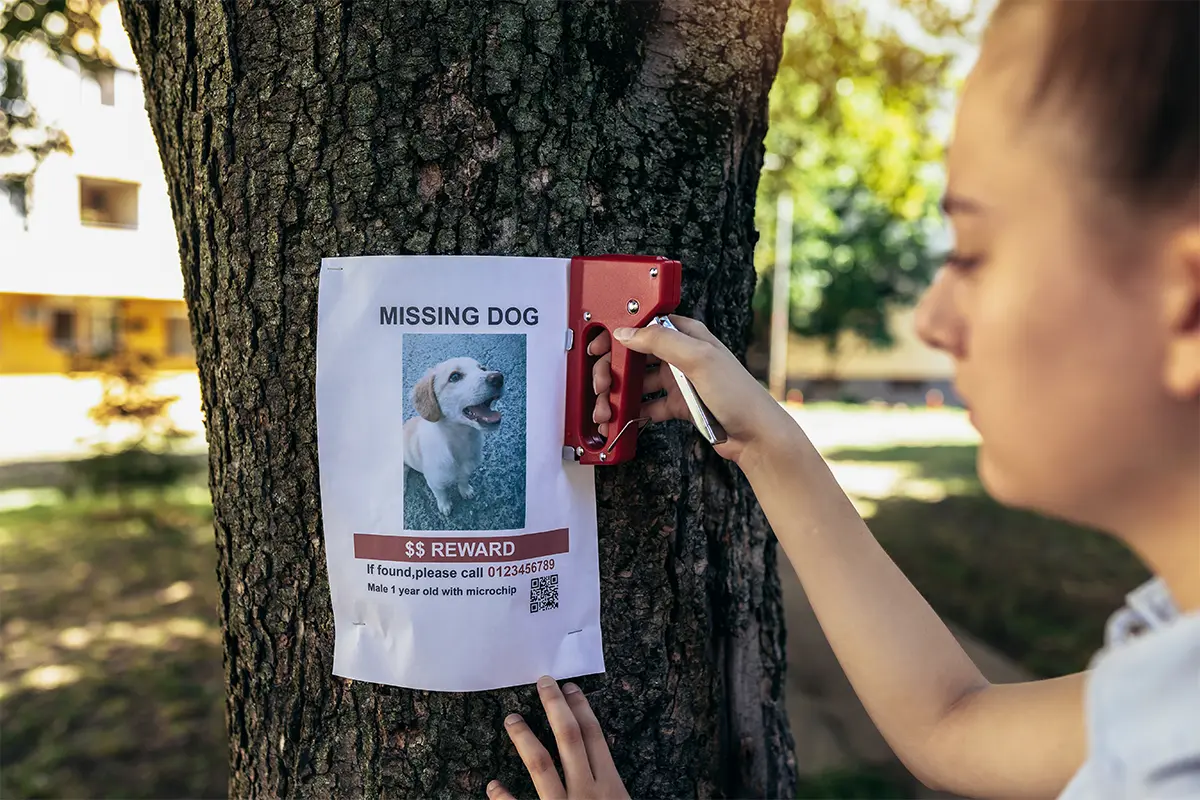Editor’s note: This article was updated on November 22, 2021.
Living in a never-ending pandemic can be lonely. Whether you’re living alone, with roommates or your family, you might be looking to add a new member to your home, even if it’s temporary.
Fairfax County Animal Shelter would love for you to welcome a new four-legged friend to your home, especially if you’re looking for a daily excuse to walk around the neighborhood, or just get lots of love during a time when physical affection is limited.
Here, Amanda Novotny, the communications and outreach manager for Fairfax County Animal Shelter, shares how the local organization is weathering the global pandemic storm, and how you can help bring a new pet into your home safely and happily.
First, how are the animals and staff of Fairfax County Animal Shelter doing during COVID-19?
We’re doing OK! Our staff took everything in stride, and despite all the changes happening on an almost-daily basis, everyone has adjusted, and we’re all just moving forward. We’re fortunate to have so many great fosters, and they really stepped up to help us get the majority of our shelter pets into foster homes right from the start. That has given staff the breathing room to get everything settled here at the shelter with our operations and staffing schedule changes, so we’re ready for whatever happens next.
If someone is interested in fostering a pet at this time, what should their course of action be, and what should they take into consideration before fostering?
Anyone who is interested in fostering should definitely start by researching the shelters and rescues in their area—there are so many good options in Northern Virginia. There’s a lot of variety in the types of pets who need foster care, including age, species, reason for fostering, and length of foster commitment. And each organization will be different in terms of the adoption process, which is something to consider up front.
In some, fosters are very involved with bringing pets to adoption events or meeting up with potential adopters, which may differ for the organizations with physical locations. Here at the Fairfax County Animal Shelter, pets are brought back to the shelter once they’re ready for adoption, so potential adopters can meet them here.
The needs of each organization will vary, and it’s a good idea to reach out to multiple groups to find the one that will work for you! It’s also perfectly OK for each individual or family to find an organization that will match them with what they want in a foster pet. It’s important to consider the space you have available for a foster pet, the supplies you might need to get, the time commitment to transport your foster pet for veterinary visits and such, how long you’re able to keep a foster pet, and, of course, what the whole family thinks—this includes existing pets! There are so many options on organizations that need fosters, there’s bound to be a great fit for everyone’s needs. Once a likely match is found, reach out to see what the onboarding process is and then jump right in.
For those who might be unfamiliar with fostering versus adopting, what are the main differences, and how could the process still be beneficial to both the humans and animals involved?
Fostering a pet provides a temporary home for them, and is incredibly helpful in allowing pets time and space outside of a kennel environment to get ready for adoption. A pet might need a foster home while they recover from illness or an injury or surgery, or because they’re too young to be adopted, or because they’re pregnant or have nursing babies, or because they just don’t do well in a kennel environment. All of those are temporary things, and having foster homes helps shelters and rescues increase their capacity for care to help the pets who need a little extra time and space.
While pets are in foster care, they are still the responsibility of the shelter or rescue; this usually includes vet care and sometimes basic supplies. Adoption transfers ownership to the pet’s new family and is (hopefully!) a permanent step, and that’s the ultimate goal of shelters and rescues. The more pets adopted into forever-homes means more space available to help other pets who don’t yet have adoptive homes.

If someone is concerned about other pets they have and the animals getting along, or having children in the mix, what should they know before fostering, and where can they turn to for resources if needed?
It’s really important to know your pets and children, and to be mindful of their feelings in the matter. Our goal is to set foster families up for success with foster pets, and we don’t want anyone’s pets or family members to be upset about the new temporary foster addition. We recommend having a separate space for fosters, whether it’s a spare room or a bathroom (for litters of kittens), and just keeping the foster pet separate from resident pets until they’ve had a chance to settle in.
For those with kids, just make sure to supervise them with foster pets at all times. At the Fairfax County Animal Shelter, our foster coordinator takes into account the behavior and history of shelter pets who need fostering, to try and make good matches with a foster home. If we have a foster volunteer whose resident dog loves kittens, then we know they can take a litter of kittens (and that there will be some adorable photos). If we have an adult dog who’s scared of their own shadow, then maybe a foster home with younger kids isn’t a good fit. Our foster coordinator is great at taking all of that into account to try and make this a seamless program for both our wonderful foster volunteers, as well as the pets.
Each organization will have different support systems in place for their fosters, which is nice. We’ve found, for example, that our fosters really like talking with each other to problem-solve and just share cute photos.
What animals are you all fostering at this time, and are there any that are most in need of foster care?
The Fairfax County Animal Shelter is an open-admission shelter, which means we get all kinds of animals. Dogs, puppies, cats, kittens, rabbits, guinea pigs, rats, mice, hamsters, snakes, geckos, bearded dragons, ferrets, all kinds of birds, hens and roosters, and even the occasional pig. Pretty much all of those have needed a foster home at one time or another. Our biggest needs are for fosters who can take large adult dogs, pregnant or nursing cats, and bottle-baby orphan kittens. What we call “kitten season” is right around the corner, and we usually see an increase in bottle-baby kittens each spring.
How can people best continue to support you all through the global pandemic?
If people have the capacity to help our shelter, we always welcome donations. We have a wish list online for items to support our pets both in the shelter and in foster homes. We’re also starting to collect supplies that will help us with pet retention programs—if we can keep pets with their families, that’s the best option! Our website has the full list. We are also fortunate to have a nonprofit fundraising partner, the Friends of the Fairfax County Animal Shelter. When we have pets who need expensive lifesaving surgeries, we ask for their help, and they never say no. They’re able to help our shelter pets because of generous supporters, and we couldn’t do what we do without them. Definitely check them out online.
What keeps you hopeful during this time, for both the staff of the shelter and the animals?
So many things! We’ve got a compassionate and hardworking staff. Our volunteers are amazing and so dedicated to our shelter pets and our mission. The fosters just always come through, and it’s awesome to see pets flourish in their homes. Our Friends group works so hard to fundraise to support the shelter pets who need help the most. Fairfax County leadership is great too. We’re so fortunate to be part of an animal-loving community that really shows up for our pets. And our adopters are the best! So many times I’ve been part of conversations that include the phrase, “We can find an adopter for that pet.” Senior dog with a tumor on his heart? Adopted. Ancient cat with no teeth? Adopted. Energetic young dog bouncing off the walls and literally standing on counter tops? Adopted. Escape artist, loud hound dog with really bad separation anxiety? Adopted. Wobbly kitten with cerebellar hypoplasia? Adopted! I could write a really long list with so many examples of pets who might be a little harder to place, and our community comes through. There are really awesome people out there who want to help pets in so many ways, and I love being a part of it.
Is there anything else readers should know about fostering, adoption, or the shelter at this time?
If anyone wants to adopt or foster, go to your local shelter (or rescue). We’re of course happy when folks choose to visit us here at the Fairfax County Animal Shelter, but we also like to share the love, and encourage adoption (and foster), with any of the great shelters in this area. We’re friends with our neighbors at the Loudoun County Animal Shelter, the Prince William County Animal Shelter, the Animal Welfare League of Arlington, the Animal Welfare League of Alexandria, the Humane Rescue Alliance in Washington, DC, and the Montgomery County Animal Services and Adoption Center in Maryland. No matter where people choose to adopt or foster, it’s great!
For more coverage on furry friends in Northern Virginia, subscribe to our monthly Pets newsletter.


